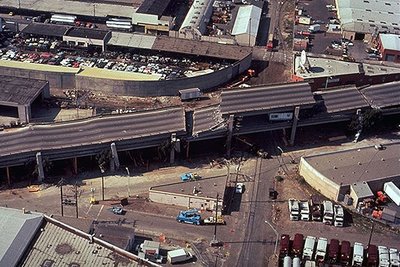 The Loma Prieta earthquake occurred on October 17, 1989, in the greater San Francisco Bay Area in California at 5:04 p.m. local time and measured 6.9 on the Moment magnitude scale (surface-wave magnitude 7.1). It occurred during the 1989 World Series, which happened to match up the Bay Area's two Major League Baseball teams, the Oakland Athletics against the San Francisco Giants. The earthquake lasted for 15 seconds. Its epicenter was at geographical coordinates 37.04° N 121.88° W south-southwest of Loma Prieta Peak in the unincorporated area of Aptos. This location, in the Santa Cruz Mountains' Forest of Nisene Marks State Park, is about ten miles (16 km) northeast of the city of Santa Cruz, California. The focus point was at a depth of 16.79 km, or 10 miles.
The Loma Prieta earthquake occurred on October 17, 1989, in the greater San Francisco Bay Area in California at 5:04 p.m. local time and measured 6.9 on the Moment magnitude scale (surface-wave magnitude 7.1). It occurred during the 1989 World Series, which happened to match up the Bay Area's two Major League Baseball teams, the Oakland Athletics against the San Francisco Giants. The earthquake lasted for 15 seconds. Its epicenter was at geographical coordinates 37.04° N 121.88° W south-southwest of Loma Prieta Peak in the unincorporated area of Aptos. This location, in the Santa Cruz Mountains' Forest of Nisene Marks State Park, is about ten miles (16 km) northeast of the city of Santa Cruz, California. The focus point was at a depth of 16.79 km, or 10 miles. The Loma Prieta was a major earthquake, and caused severe damage as far as 50 miles away from its epicenter; most notably in San Francisco, Oakland, the San Francisco Peninsula, and in areas closer to the epicenter in the communities of Santa Cruz, the Monterey Bay, Watsonville, and Los Gatos. Most of the major property damage in the more distant areas resulted from liquefaction of soil used over the years to fill in the waterfront and then built upon.
The Loma Prieta was a major earthquake, and caused severe damage as far as 50 miles away from its epicenter; most notably in San Francisco, Oakland, the San Francisco Peninsula, and in areas closer to the epicenter in the communities of Santa Cruz, the Monterey Bay, Watsonville, and Los Gatos. Most of the major property damage in the more distant areas resulted from liquefaction of soil used over the years to fill in the waterfront and then built upon.
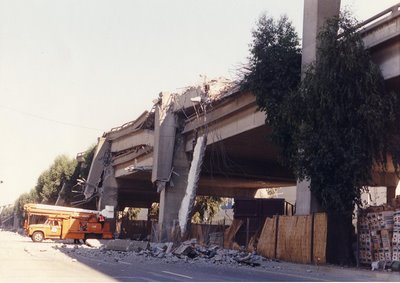 The magnitude and distance of the earthquake from the severe damage to the north were surprising to geotechnologists. Subsequent analysis indicates that the damage was likely due to reflected seismic waves - the reflection from well-known deep (about 15 miles) discontinuities in the Earth's gross structure.
The magnitude and distance of the earthquake from the severe damage to the north were surprising to geotechnologists. Subsequent analysis indicates that the damage was likely due to reflected seismic waves - the reflection from well-known deep (about 15 miles) discontinuities in the Earth's gross structure.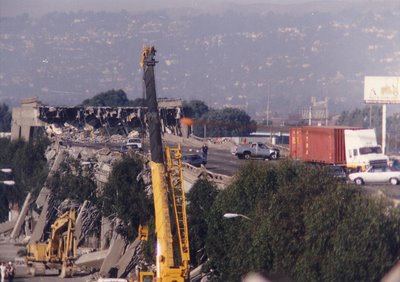 There were 57 deaths directly caused by the earthquake, and six more deaths were ruled to be indirectly caused by the temblor[1]. In addition, there were 3,757 injuries as a result of the earthquake. The highest concentration of fatalities, 42, occurred in the collapse of the Cypress Street Viaduct on the Nimitz Freeway (Interstate 880), where a double-decker portion of the freeway collapsed, crushing the cars on the lower deck. One 50-foot (15 m) section of the San Francisco-Oakland Bay Bridge also collapsed, causing two cars to fall to the deck below, leading to the single fatality on the bridge. The bridge was closed for repairs for a month and one day, reopening on November 18. While the bridge was closed, ridership on Bay Area Rapid Transit and ferry services soared, along with traffic levels on nearby bridges such as the Richmond-San Rafael and the Golden Gate.
There were 57 deaths directly caused by the earthquake, and six more deaths were ruled to be indirectly caused by the temblor[1]. In addition, there were 3,757 injuries as a result of the earthquake. The highest concentration of fatalities, 42, occurred in the collapse of the Cypress Street Viaduct on the Nimitz Freeway (Interstate 880), where a double-decker portion of the freeway collapsed, crushing the cars on the lower deck. One 50-foot (15 m) section of the San Francisco-Oakland Bay Bridge also collapsed, causing two cars to fall to the deck below, leading to the single fatality on the bridge. The bridge was closed for repairs for a month and one day, reopening on November 18. While the bridge was closed, ridership on Bay Area Rapid Transit and ferry services soared, along with traffic levels on nearby bridges such as the Richmond-San Rafael and the Golden Gate.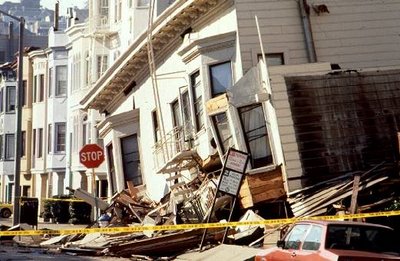 The quake also caused an estimated $6 billion in property damage, the costliest natural disaster in U.S. history at the time. It was the largest earthquake to occur on the San Andreas Fault since the great 1906 San Francisco earthquake. Private donations poured in to aid relief efforts and on October 26, President George H.W. Bush signed a $3.45 billion earthquake relief package for California.
The quake also caused an estimated $6 billion in property damage, the costliest natural disaster in U.S. history at the time. It was the largest earthquake to occur on the San Andreas Fault since the great 1906 San Francisco earthquake. Private donations poured in to aid relief efforts and on October 26, President George H.W. Bush signed a $3.45 billion earthquake relief package for California.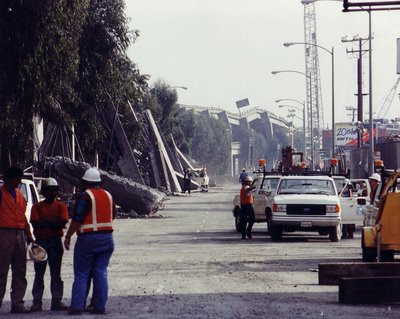 The Loma Prieta earthquake irrevocably changed the San Francisco Bay Area's transportation landscape. Not only did the quake force seismic retrofitting of all San Francisco Bay Area bridges, it caused enough damage that some parts of the region's freeway system had to be demolished. In some cases, the freeways in question had never been completed, terminating in mid-air; in that regard, the quake provided the impetus to deal with regional transportation problems that had gone largely unsolved for decades.
The Loma Prieta earthquake irrevocably changed the San Francisco Bay Area's transportation landscape. Not only did the quake force seismic retrofitting of all San Francisco Bay Area bridges, it caused enough damage that some parts of the region's freeway system had to be demolished. In some cases, the freeways in question had never been completed, terminating in mid-air; in that regard, the quake provided the impetus to deal with regional transportation problems that had gone largely unsolved for decades.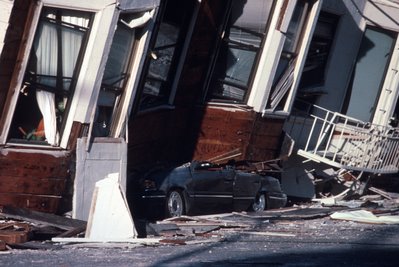 An automobile lies crushed under the third story of this apartment building in the Marina District. The ground levels are no longer visible because of structural failure and sinking due to liquefaction.
An automobile lies crushed under the third story of this apartment building in the Marina District. The ground levels are no longer visible because of structural failure and sinking due to liquefaction.

